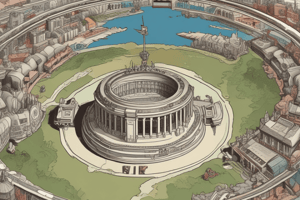Podcast
Questions and Answers
In a theocratic system, what holds supreme power and authority?
In a theocratic system, what holds supreme power and authority?
- A religious authority (correct)
- A group of elected representatives
- A democratic council
- A monarch
Which branch of government is responsible for making the laws?
Which branch of government is responsible for making the laws?
- Legislative (correct)
- Judicial
- Administrative
- Executive
Which function of government is responsible for maintaining peace and stability?
Which function of government is responsible for maintaining peace and stability?
- Law and Order (correct)
- Social Welfare
- Foreign Policy
- Economic Management
What is the key concept that refers to the ultimate authority and power of a government?
What is the key concept that refers to the ultimate authority and power of a government?
In a federal system, how is power divided?
In a federal system, how is power divided?
What is the system of limitations on each branch of government to prevent abuse?
What is the system of limitations on each branch of government to prevent abuse?
Which type of government is characterized by a single, centralized government with authority over all regions?
Which type of government is characterized by a single, centralized government with authority over all regions?
Which branch of government is responsible for enforcing the laws?
Which branch of government is responsible for enforcing the laws?
What is the system where citizens elect representatives to make decisions on their behalf?
What is the system where citizens elect representatives to make decisions on their behalf?
Which type of government is characterized by a single person or group holding power, often with limited civil liberties?
Which type of government is characterized by a single person or group holding power, often with limited civil liberties?
Flashcards are hidden until you start studying
Study Notes
Types of Government
- Monarchy: A system where a single person (king or queen) holds supreme power and authority.
- Democracy: A system where power is held by the people, either directly or through elected representatives.
- Authoritarian: A system where a single person or group holds power, often with limited civil liberties.
- Theocracy: A system where a religious authority holds power.
- Totalitarian: A system where a single person or group holds complete power, often with strict control over citizens.
Branches of Government
- Legislative: Makes the laws (e.g. Congress, Parliament).
- Executive: Enforces the laws (e.g. President, Prime Minister).
- Judicial: Interprets the laws (e.g. Supreme Court).
Functions of Government
- Law and Order: Maintains peace and stability, enforces laws.
- Protection of Rights: Protects citizens' rights and freedoms.
- Economic Management: Manages the economy, regulates trade and commerce.
- Social Welfare: Provides public services and support for citizens.
- Foreign Policy: Represents the country internationally, conducts diplomacy.
Forms of Government
- Unitary: A single, centralized government with authority over all regions.
- Federal: A system where power is divided between a central government and smaller regional governments.
- Confederal: A loose alliance of independent states with a weak central government.
Key Concepts
- Sovereignty: The ultimate authority and power of a government.
- Separation of Powers: The division of power among branches of government to prevent abuse.
- Checks and Balances: The system of limitations on each branch of government to prevent abuse.
- Representative Democracy: A system where citizens elect representatives to make decisions on their behalf.
Types of Government
- Monarchy: A system where a single person (king or queen) holds supreme power and authority, often hereditary and lifelong.
- Democracy: A system where power is held by the people, either directly or through elected representatives, often characterized by free elections and protection of individual rights.
- Authoritarian: A system where a single person or group holds power, often with limited civil liberties and suppressed opposition.
- Theocracy: A system where a religious authority holds power, often with a strict adherence to religious law and doctrine.
- Totalitarian: A system where a single person or group holds complete power, often with strict control over citizens' lives, suppressing opposition and dissent.
Branches of Government
- Legislative: The branch of government that makes the laws, often comprising a parliament, congress, or assembly.
- Executive: The branch of government that enforces the laws, headed by a president, prime minister, or other chief executive.
- Judicial: The branch of government that interprets the laws, often comprising a supreme court or other high court.
Functions of Government
- Law and Order: Maintaining peace and stability, enforcing laws, and protecting citizens from internal and external threats.
- Protection of Rights: Protecting citizens' rights and freedoms, such as freedom of speech, assembly, and religion.
- Economic Management: Managing the economy, regulating trade and commerce, and providing public goods and services.
- Social Welfare: Providing public services and support for citizens, such as education, healthcare, and social security.
- Foreign Policy: Representing the country internationally, conducting diplomacy, and negotiating treaties and agreements.
Forms of Government
- Unitary: A single, centralized government with authority over all regions, often characterized by a strong central authority.
- Federal: A system where power is divided between a central government and smaller regional governments, often characterized by shared sovereignty.
- Confederal: A loose alliance of independent states with a weak central government, often characterized by cooperation and mutual aid.
Key Concepts
- Sovereignty: The ultimate authority and power of a government, often characterized by independence and self-governance.
- Separation of Powers: The division of power among branches of government to prevent abuse and ensure accountability.
- Checks and Balances: The system of limitations on each branch of government to prevent abuse and ensure accountability.
- Representative Democracy: A system where citizens elect representatives to make decisions on their behalf, often characterized by free elections and accountable governance.
Studying That Suits You
Use AI to generate personalized quizzes and flashcards to suit your learning preferences.




